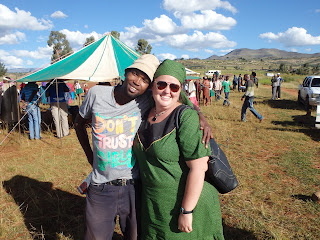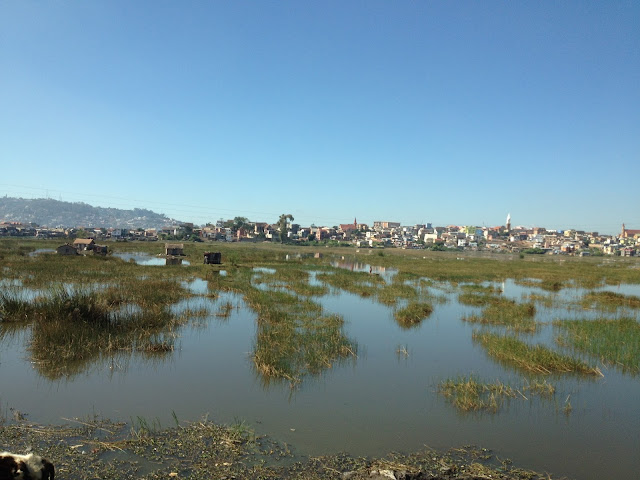As my peers have been packing in preparation for leaving
Lesotho, we have been discussing the things we packed two years ago. Most of us
overpacked. Some, like me, were able to squeak just under the weight limits for
luggage, while others were stuck with steep bag fees as penance for
over-preparedness.
Looking back, I brought way too many clothes, some I have
never worn and thanks to weight loss, will probably never wear again.
Toiletries were another bulky item I brought too much of, as almost everything
I need can be found here in Lesotho. There are other things that I brought that
I have found invaluable. Here are some of my favorite items:
Number One: Chacos-Anyone who
knew me before Peace Corps, already knows that I have been living in Chacos for
about a decade now. They are my favorite footwear regardless of weather. They
may look tacky with socks under the, but when the winter sun comes out and
warms things up, I’d still rather be in my Chacos then sneakers or Toms. Turns
out my Chacos-even without socks-are warmer than Toms too, thanks to their
thick soles insulating my little feet from cold cement and stone.
Number Two: Bralette-These
women-friendly wallets are a brilliant find from Eagle Creek. Pretty much any
time I leave my community, I have this little guy tucked away out of site. To
steal the majority of my cash, the thief would have to get pretty “friendly”
with me and would be walking away with some nasty assault charges. The one time
I tucked money in my bra loosely, I lost it. In this nifty, washable, silk guy,
I do not even notice it is there until I need access to it! Definitely worth the
pennies paid.
 Number Three: Goal Zero Solar
Panel-Living without electricity, my GoalZero stuff has been a lifesaver. I
use it almost every day. I could have bought a solar panel here in Lesotho, however, the GoalZero one is designed to be portable so I can toss it in my backpack when headed to work or to visit other volunteers. The battery packs use AA batteries, so I can stock up on power when it is sunny and store it for cloudy ones. The USB plug in lets me charge my phone, speaker, and camera. My friend ended up with electricity and therefore let me borrow his larger panel as well. This has been invaluable in winter months when the days are shorter, making it harder to get my stuff charged.
Number Three: Goal Zero Solar
Panel-Living without electricity, my GoalZero stuff has been a lifesaver. I
use it almost every day. I could have bought a solar panel here in Lesotho, however, the GoalZero one is designed to be portable so I can toss it in my backpack when headed to work or to visit other volunteers. The battery packs use AA batteries, so I can stock up on power when it is sunny and store it for cloudy ones. The USB plug in lets me charge my phone, speaker, and camera. My friend ended up with electricity and therefore let me borrow his larger panel as well. This has been invaluable in winter months when the days are shorter, making it harder to get my stuff charged.  Number Four: Good Knives- Okay,
I admit it, but American standards (including my own), the two kitchen knives I
brought with me do not actually qualify as “good” knives. Compared to what can
easily be purchased here in Lesotho, however, these two knives (and my
sharpening stone from my sailing days) have proved invaluable. I have one
locally bought knife and its edge is actually more rounded than the edge of a
spoon. I tried sharpening it but to no avail. I still do not understand how my
brothers and mother can use that knife to peel peaches or squash when I cannot
get it to work at all. I am pretty sure my sanity and love of cooking would have
both become questionable has I not brought these two colorful knives to keep
myself happy.
Number Four: Good Knives- Okay,
I admit it, but American standards (including my own), the two kitchen knives I
brought with me do not actually qualify as “good” knives. Compared to what can
easily be purchased here in Lesotho, however, these two knives (and my
sharpening stone from my sailing days) have proved invaluable. I have one
locally bought knife and its edge is actually more rounded than the edge of a
spoon. I tried sharpening it but to no avail. I still do not understand how my
brothers and mother can use that knife to peel peaches or squash when I cannot
get it to work at all. I am pretty sure my sanity and love of cooking would have
both become questionable has I not brought these two colorful knives to keep
myself happy.  Number Five: Camera-When it
comes to cameras, I definitely overpacked. I brought my trusty DSLR, my iPhone,
and an Olympus Stylus Tough. I figured I would use them in that order, however,
the reality has been that the Stylus is my go to most of the time. The DSLR is
too bulky and too flashy for my every day. The phone takes okay photos, but the
Stylus takes great photos and can stand up to life’s challenges. I do not
hesitate to let kids hold it and look at or take photos on it. I do not worry
about it being exposed during a sudden summer downpour. On top of that, it can
charge from my solar panel, unlike my DSLR. (Disclaimer: I still adore my
little red DSLR and use it mostly on vacations when I anticipate great
opportunities for photography nerdiness.)
Number Five: Camera-When it
comes to cameras, I definitely overpacked. I brought my trusty DSLR, my iPhone,
and an Olympus Stylus Tough. I figured I would use them in that order, however,
the reality has been that the Stylus is my go to most of the time. The DSLR is
too bulky and too flashy for my every day. The phone takes okay photos, but the
Stylus takes great photos and can stand up to life’s challenges. I do not
hesitate to let kids hold it and look at or take photos on it. I do not worry
about it being exposed during a sudden summer downpour. On top of that, it can
charge from my solar panel, unlike my DSLR. (Disclaimer: I still adore my
little red DSLR and use it mostly on vacations when I anticipate great
opportunities for photography nerdiness.)
Honorable Mention...Also known as What I should have packed…A Pastry Knife-While I have always been a fewer gadgets is better
kind of person, my time in Lesotho has me baking far more than I have before. I
survived using a fork to break up butter to make scones, sweet breads, apple
crisp, and more. Then my sister visited me and laughed at my efforts. As soon as she returned to America, she
bought me my very first pastry knife. This thing is better than gold! It does
all the things it is supposed to do and even mashes bananas for banana bread and eggs for egg salad!





























